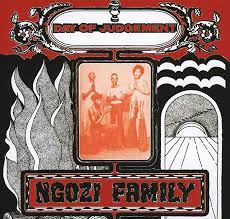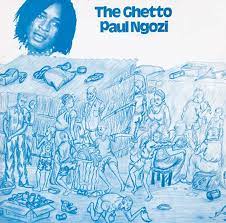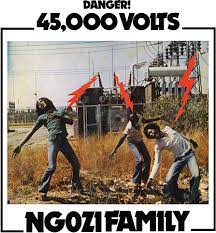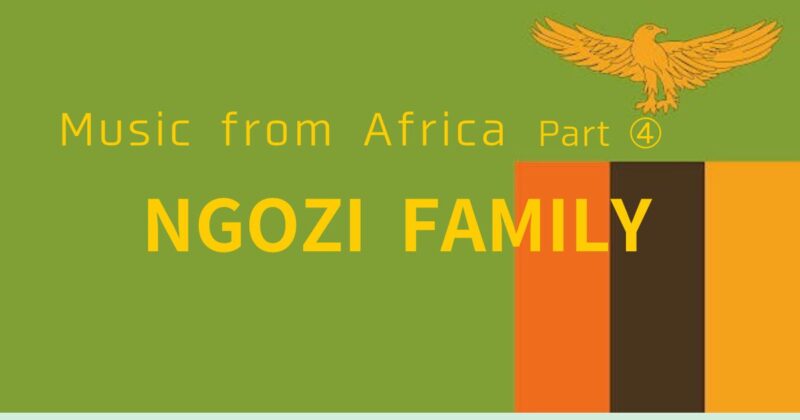Hi! It’s konkaz (@konkazuk) here.
Summer is here!
It’s time to rock on!
And its time for Africa!
(Apologies if you’re reading this article in a season other than summer. 🙏)
Anyway, have you ever heard the word “Zamrock“?
Some people might find it hard to associate an image of Africa with rock music, however, from the mid-1970s to 1980s, there was a vibrant rock scene in Zambia, a country located in southern Africa.
With Witch (one of my colleagues from Zambia said he knew one of the band members) at the forefront, there were fabulous rock bands like Ngozi Family and Amanaz emerged during that time, making their mark in the music scene.
For those who are interested, there is a video about “Zamrock” available on YouTube, so please check out the link below. 👇
What did you think?
I’m sure there are quite a few people whose musical taste covers the style of what they do…?
So, this time I’ll introduce three recommended albums from the band called “Ngozi Family” which I got really hooked on for a while.
Day Of Judgement

The first one I would like to recommend is the album called “Day Of Judgement“, but before going through the musical aspects of this album, let me just briefly note the historical context of the time when this album was released.
This album was released in 1975, a year when “punk rock” was blossoming in London and New York.
On the other hand, during this period, significant events were happening in Africa.
In neighboring countries of Zambia at the time, Angola to the west and Mozambique to the east, independence was achieved from Portuguese colonial rule after prolonged conflicts.
And in South Africa, black communities were suffering under the oppressive system of apartheid imposed by the white society.
Zambia achieved independence from British colonial rule in 1964, however, it was facing tensions with its southern neighbor, Southern Rhodesia (later known as Zimbabwe).
In such circumstances, Zambia’s few rock musicians seemed to be influenced by “UK rock music scene” with bands like Jimi Hendrix, Ten Years After, Cream, and others, because of the country’s history as a former British colony.
The band leader “Paul Ngozi” (pronounced “Ngōzī” according to my colleague) had a great admiration for the band Ten Years After and it is said that before renaming his own band as “Ngozi Family,” he initially performed under the name of “Ten Years Before” as a tribute to them.
Now, getting back to the main topic, let’s talk about the album “Day Of Judgement“.
The recording lineup for this album consisted of…
Paul Ngozi: on vocals and lead guitar
Chrissy Zebby Tempo : on drums
Tommy Mwale : on bass
Peter Bwalya : on rhythm guitar
If you happen to be a fan of late 1960s to early 1970s rock music, then the music of “Ngozi Family” will undoubtedly strike a chord in your heart.

If I were to convey the band’s image super roughly, I would say that they play with the manner of Jimi Hendrix with riff-heavy groove which could be heard from the early days of Led Zeppelin or Black Sabbath, however rhythm section keeps it as straightforward as possible (not as complicated as what you hear from Mitch and Noe) but very lively, all while delivering a compelling message.
The raw sound of this album that distinguishes it from what you hear in nowadays’ overproduced rock music is one of its great charms that appeals to listeners.
As they are fundamentally Christians, “Jesus Christ” is occasionally involved in the lyrics, however, as long as you don’t have a twisted anti-religious sentiment and can view it objectively, it will not be a problem. (After all, even the Stones and Dylan have covered blues numbers about Christ…)
My favorite tracks are “Hi Babe,” the second song, and “I Wanna Know,” the third song.
With simple lyrics that resonate in any era, these songs take a lively, garage rock approach. However, when Paul’s guitar solo with a heavy “fuzz” sound kicks in, you can’t help but feel an eerily captivating atmosphere (in a good way).
The fifth track, “Tikondane,” has got a cool Velvet Underground vibe to it, but unfortunately, because the lyrics are sung in their native language, we cannot understand what the song is about.
The seventh track, “Let Me Know,” has a heartwarming effect as the sentimentally touching melody perfectly matches the line in the chorus: “Please let me know what you think about me.”
The raw and energetic sound, coupled with rhythm-driven songs, can be experienced throughout the entire album and that is creating a sense of live performance, I believe.
And the album makes you feel like entering a new youth-filled journey. w
So, for those who are interested in records, you can purchase them from here.👇
The Ghetto

The second recommended release is the solo album “The Ghetto” by the band’s leader, “Paul Ngozi“.
Although it’s referred to as a solo project, it’s essentially a trio band formation without the rhythm guitarist Peter Bwalya who played for “Day Of Judgement” album.
In this album, several medium-tempo tracks are featured and some of them have got a pleasant reggae vibe (more precisely, a reggae-ish feel) and it somehow evokes thoughts of Bob Marley.
The lyrics are also remarkable.
The first track, “Ghetto,” addresses parents in the impoverished area, singing a message like, “Stop drinking irresponsibly and think about your children’s future! Otherwise, when you become old, they won’t come near you.” I believe this type of song resonates beyond its time.
The second track, “Help Me,” makes you feel like commenting, “Hey, isn’t the guitar riff in the verse the same as the one in the first track of Day Of Judgement album?”, but there is actually a subtle difference. w
Well, that’s part of its charm…
The fifth track, which is called “Suicide,” rocks.
It delivers a message like, “No matter what your family does to you, no matter if your girlfriend betrays you, no matter what your mother says, you must never commit suicide.”
By the way, I remember committing suicide is considered a sin in Christianity, …if my memory serves me well?
The third, sixth, and eighth tracks are sung in their native language, however, the resonance of unfamiliar words combined with the interplay of rock guitars sounds absolutely captivating.
I cannot understand all the lyrics here but I believe the album has got a theme like “do not give up in adversity you are confronting” which likely symbolize the state of the country at that time. This is s a great album!
45,000 volts

I had decided to pick three albums, so for the last one, I was in two minds between “My Ancestors” and “45,000 Volts” but I ended up selecting the latter.

Once you see this cheesy but great-looking sleeve, I am sure you can understand why I had no choice but to choose this one.
From the very first track, the guitar’s heavy fuzz sound gives you a momentary thought of “Wait, did they go into metal territory?”
But then, the drums kick in with a dry, simple, and lively sound reminiscent of Charlie Watts from The Rolling Stones, while the bass drives forward with a gritty determination, making it clear that it’s not a metal sound.
And Paul doesn’t just go all-out on guitar throughout the songs and that gives us an impression that he is prioritizing his vocals and rhythm with this album.
There are often no rhythm guitars and the vocals are backed solely by the drums and bass.
In this familiar Ngozi style, it goes on and on, and we eventually reach this sixth track. This song called “House of Fear” sounds the highlight of the album to me… wouldn’t you agree?
Speaking of the intriguing (in a good way) nature of Paul’s guitar, I personally find it shares similarities with Neil Young’s cheesiness. They both seem to intentionally poke at those embarrassing, “cringeworthy” aspects of being human, creating a captivating allure. w
Throughout the entire album, there is a brightness and a strong African essence that shines through the vocals, and these elements are making this album fat. The rhythms are tight, and the album is filled with a sense of liberation.
If this album had been released in Europe or America, riding the wave of the zeitgeist, I am confident it would have become a classic in rock history, and people would still be talking about it to this day.
This one is also available on analog vinyl format.👇
Finally, as you can see from watching the YouTube video of “Zamrock” which I featured in the beginning, Zambia during that time was grappling with the epidemic of AIDS, and sadly, the majority of the Zambian rock ‘n’ rollers who rocked through the 70s and 80s fell victim to HIV and passed away.
The rock scene in Zambia faded away as described, but luckily, we can now enjoy these recordings through reissued vinyl records.
konkaz
You can read this blog post in Japanese from the link below.
👉 アフリカは南部の国、”ザンビア”のロックレボリューション:ザム・ロックの躍動!

